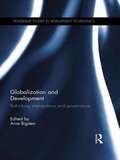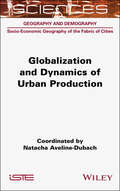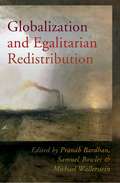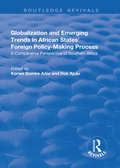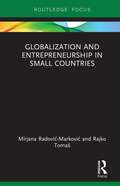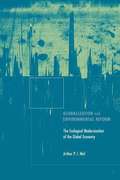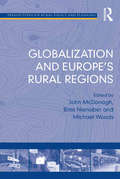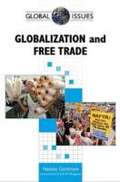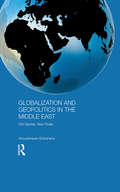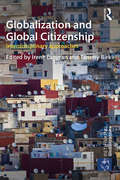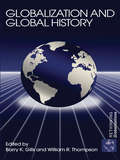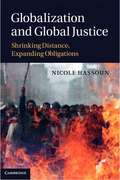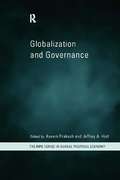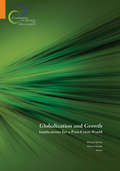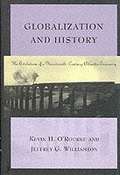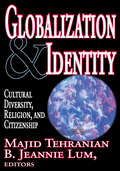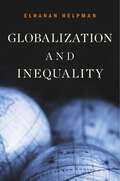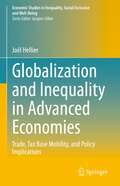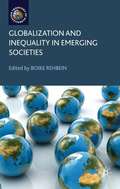- Table View
- List View
Globalization and Development: Rethinking Interventions and Governance (Routledge Studies in Development Economics #102)
by Arne BigstenThe key challenge for achieving sustained development in developing countries relates to quality of domestic governance, which in turn is strongly affected by external interventions. Domestic governance includes politics, policy formulation, institution building and policy implementation. It is important for both international and domestic agents to understand how the interplay between external interventions and domestic governance affects social and economic outcomes. This volume presents a series of studies analysing the links between external interventions and domestic governance in the areas of economic, social and security policy. Key questions that are addressed here include: How do external interventions in economic, social and security areas affect domestic governance in developing countries? Is aid more effective in decentralised systems of government? What are the interactions between external interventions and domestic governance? How can external agents advance domestic governance? Due to its strong focus on external interventions and domestic governance, this book will be of interest to scholars of development studies across the social sciences, in addition to the fields of economics, political science, sociology and geography.
Globalization and Diversity: Geography of a Changing World (Second Edition)
by Lester Rowntree Martin Lewis Marie Price William WyckoffGlobalization and Diversity is an exciting contemporary approach to World Regional Geography that explicitly acknowledges the geographic changes that accompany today's rapid rate of globalization. Organizes each regional chapter into five thematic sections: Environmental Geography; Population and Settlement; Cultural Coherence and Diversity; Geopolitical Framework; Economic and Social Development.
Globalization and Dynamics of Urban Production
by Natacha Aveline-DubachOver the last 20 years, urbanization processes have undergone profound transformations under the growing influence of private actors, particularly in the financial sector. This has exposed the physical environment of various cities to global capital flows, which has generated an overall rise in real estate values on a global scale. This is often disconnected from the financial capacities of local actors – primarily households – which then increases the inequalities and vulnerabilities of societies regarding financial and environmental risks. This book offers the keys to understanding these new dynamics of capital accumulation in the general built-up environment of cities by taking into account the diversity of their configurations, their intensity and their urban effects according to national contexts. Beyond the cases involving the major Western countries, the initial centers of the financial industry and the theorizations on the urban, this book addresses the particular contexts of real estate production in four major regions: Northeast Asia, Southeast Asia, the Middle East and West Africa.
Globalization and Egalitarian Redistribution
by Pranab Bardhan Samuel Bowles & Michael WallersteinCan the welfare state survive in an economically integrated world? Many have argued that globalization has undermined national policies to raise the living standards and enhance the economic opportunities of the poor. This book, by sixteen of the world's leading authorities in international economics and the welfare state, suggests a surprisingly different set of consequences: Globalization does not preclude social insurance and egalitarian redistribution--but it does change the mix of policies that can accomplish these ends. <P><P>Globalization and Egalitarian Redistribution demonstrates that the free flow of goods, capital, and labor has increased the inequality or volatility of labor earnings in advanced industrial societies--while constraining governments' ability to tax the winners from globalization to compensate workers for their loss. This flow has meanwhile created opportunities for enhancing the welfare of the less well off in poor and middle-income countries. Comprising eleven essays framed by the editors' introduction and conclusion, this book represents the first systematic look at how globalization affects policies aimed at reducing inequalities. The contributors are Keith Banting, Pranab Bardhan, Carles Boix, Samuel Bowles, Minsik Choi, Richard Johnston, Covadonga Meseguer Yebra, Karl Ove Moene, Layna Mosley, Claus Offe, Ugo Pagano, Adam Przeworski, Kenneth Scheve, Matthew J. Slaughter, Stuart Soroka, and Michael Wallerstein.
Globalization and Emerging Trends in African States' Foreign Policy-Making Process: A Comparative Perspective of Southern Africa
by Rok AjuluThis title was first published in 2002: The resurgence of the democratization movement in Africa in the post-Cold War era is gradually replacing authoritarianism with forms of democratic systems. These changes have put into question the traditional big man image of African states’ foreign policy and foreign policy-making. The first book of its kind to focus on the foreign policy-making process of Southern African countries in the era of globalization, these instructive and rewarding case studies contextualize the increasing involvement of other internal actors in African states foreign policy-making process. Foreign policy actors such as the Presidency, Ministries of Defence, Foreign Affairs, Trade, Finance and the Intelligence Community, among others, are examined in a comparative perspective.
Globalization and Entrepreneurship in Small Countries (Routledge Focus on Business and Management)
by Mirjana Radović-Marković Rajko TomašThe changeable business environment requires a new business framework and an understanding of the global market trends and the culture that will impact on business. Globalization and Entrepreneurship in Small Countries considers important business principles and makes them accessible for entrepreneurs and small business owners. It addresses the role of managers and leaders and management techniques in the context of global strategy of companies, as well as the culture diversity that comes with globalization of organizations. To meet the constantly changing conditions and demands, business must transcend boundaries to get what it needs regardless of where it exists – geographically, organizationally, and functionally. This book draws together earlier literature on SME development and internationalization from disparate sources into a cohesive body of work, which traces the evolution of our understanding of the topic. It explores just how globalization affects the demand for business and entrepreneurship, and will therefore be of interest to researchers, academics, policymakers, and students in the fields of entrepreneurship, globalisation, organisational studies, and SMEs development in small countries.
Globalization and Environmental Reform: The Ecological Modernization of the Global Economy
by Arthur P. J. MolMany writers either glorify globalization or vilify it, particularly for its destructive environmental effects. In this book environmental sociologist Arthur Mol provides a more balanced understanding of the relationship between globalization and environmental quality. Mol bases his arguments on his theory of ecological modernization, which holds that although processes of modernization and globalization often result in environmental degradation, they also can encourage policies and programs designed to arrest degradation and improve environmental quality. Building on earlier ecological modernization studies that focused on Europe, North America, and East and Southeast Asia, Mol takes here a more global perspective. He also addresses the increasing roles of nonstate actors, especially international institutions, nongovernmental organizations, popular movements, and transnational corporations. After examining the confusion created by the failure to distinguish among globalization, global capitalism, and neoliberalism, Mol analyzes both globalization's destructive environmental consequences and its contribution to global environmental reform. Elaborating on the subject of reform, he focuses on three case studies, one involving the economic triad of the European Union, the NAFTA region, and Japan; one involving the relationship between the triad and developing countries; and one involving three developing countries: Vietnam, the Netherlands Antilles, and Kenya.
Globalization and Europe's Rural Regions (Perspectives On Rural Policy And Planning Ser.)
by Birte NienaberThis book examines the multiple ways in which rural regions in Europe are being restructured through globalization and the regional development responses that they have adopted. It provides an understanding of the key challenges and opportunities for rural regions arising from the major economic, social, political and cultural changes associated with globalization, including trade liberalization and economic deregulation, increased international migration, and the rise of global consciousness about environmental issues. Drawing on examples and findings from a major European research project, DERREG, the book presents detailed case studies of ten regions in different parts of Europe, exploring the factors that lead to different experiences of globalization in each of the regions, and highlighting examples of good practice in regional development responses. The book concludes by proposing a typology of regional responses to globalization and considering the policy implications of the research findings. As such, ’Globalization and Europe’s Rural Regions’ is important reading for geographers, sociologists, planners and economists interested in understanding the impact of globalization in rural regions, and for rural development professionals seeking to mobilize effective responses.
Globalization and European Welfare States: Challenges and Change
by Bruno Palier Robert Sykes Pauline M. Prior<p>This book seeks to counter the recent trend of speculation about the impact of globalization upon welfare states. It begins by asking two related questions: 'What exactly is globalization?' 'How, if at all, has globalization been implicated in recent changes to European welfare states?' <p>The book combines both theoretical and empirical analysis to provide a critical account of the relationship between globalization and change in European welfare states. <p>Firstly the key theoretical and conceptual debates are reviewed and the existing perspectives on globalization and welfare policy change are assessed. The text moves on to explore and challenge the more apocalyptic economic perspectives on globalization and welfare that suggest permanent retrenchment. The discussion includes an outline and assessment of the role of international organisations such as the World Bank and the EU. <p>All the major types of European national welfare system are considered: Bismarkian, Southern, Central and Eastern European, Nordic and Liberal. Individual chapters outline recent welfare policy changes in the European countries of each system, and the role of globalization in such changes. <p>This ground-breaking text provides new empirical and theoretical perspectives on links between globalization and European welfare state change. It will be important reading for students and academics in the fields of social policy, politics, international relations, European studies and related fields.</p>
Globalization and Food Sovereignty
by Jeffrey Ayres Peter Andree Michael Bosia Marie-Josee MassicotteIn recent years, food sovereignty has emerged as a way of contesting corporate control of agricultural markets in pursuit of a more democratic, decentralized food system. The concept unites individuals, communities, civil society organizations, and even states in opposition to globalizing food regimes.This collection examines expressions of food sovereignty ranging from the direct action tactics of La Vía Campesina in Brazil to the consumer activism of the Slow Food movement and the negotiating stances of states from the global South at WTO negotiations. With each case, the contributors explore how claiming food sovereignty allows individuals to challenge the power of global agribusiness and reject neoliberal market economics.With perspectives drawn from Europe, the Americas, Asia, Africa, and Australia, Globalization and Food Sovereignty is the first comparative collection to focus on food sovereignty activism worldwide.
Globalization and Free Trade
by Natalie GoldsteinIntended to be accessible to audiences at the high school level and up, this volume provides both a primer on issues of economic globalization and a guide to further research. It describes the historical and ideological development of laissez-faire and neoliberal economics and the debates about their implementation in the United States and around the world. It also presents a collection of primary source documents from US and international contexts, presents key facts and figures, lists relevant organizations and agencies along with their contact information, and provides an annotated bibliography. Annotation ©2007 Book News, Inc., Portland, OR (booknews.com)
Globalization and Geopolitics in the Middle East: Old Games, New Rules (Durham Modern Middle East and Islamic World Series)
by Anoushiravan EhteshamiExamining globalization in the Middle East, this book provides a much needed assessment of the impact of globalization in the ‘greater’ Middle East, including North Africa, in the context of the powerful geopolitical forces at work in shaping the region today. Written by a well-known authority in this area, this book demonstrates that, unlike in other regions, such as East Asia, geopolitics has been a critical factor in driving globalization in the Middle East. The author argues that whereas elsewhere globalisation has opened up the economy, society, culture and attitudes to the environment; in the Middle East it has had the opposite effect, with poor state formation, little interregional trade, foreign and interregional investment, and reassertion of traditional identities. This book explores the impact of globalization on the polities, economies and social environment of the greater Middle East, in the context of the region’s position as the central site of global geopolitical competition at the start of the twenty-first century.
Globalization and Global Citizenship: Interdisciplinary Approaches (Rethinking Globalizations)
by Irene Langran Tammy BirkGlobalization and Global Citizenship examines the meaning and realities of global citizenship as a manifestation of recent trends in globalization. In an interdisciplinary approach, the chapters outline and analyse the most significant dimensions of global citizenship, including transnational, historical, and cultural variations in its practice; foreign and domestic policy influences; and its impact on personal identities. The contributions ask and explore questions that are of immediate relevance for today’s scholars, including: How does globalization in its current form present a new set of challenges for states, non-state actors, and individual citizens? How has globalization diminished, expanded, or complicated notions of citizenship? What rights could exist outside the context of state sovereignty? How can social accountability be imagined beyond the borders of towns, cities, or states? What forms of political representational legitimacy could be productive on the global level? When is it useful, possible or desirable for individuals to identify with global political communities? Drawing together a broad range of contributors and cutting edge research the volume offers chapters that seek to reflect the full spectrum of approaches and topics, providing a valuable resource which highlights the value of an extended and thoughtful study of the idea and practice of global citizenship within a broader consideration of the processes of globalization. It will be of great use to graduates and scholars of international relations, sociology, and global studies/affairs, as well as globalization.
Globalization and Global History (Rethinking Globalizations #Vol. 3)
by William R. Thompson Barry K. GillsGlobalization and Global History argues that globalization is not an exotic and new phenomenon. Instead it emphasizes that globalization is something that has been with us as long as there have been people who are both interdependent and aware of that fact. Studying globalization from the vantage point of long-term global history permits theoretical and empirical investigation, allowing the authors collected to assess the extent of ongoing transformations and to compare them to earlier iterations. With this historical advantage, the extent of ongoing changes - which previously appeared unprecedented - can be contrasted to similar episodes in the past. The book is divided into three sections. The first focuses on how globalization has been written about from a historical perspective. The second part advances three different takes on how best to view globalization from a very long-term stance. The final section continues this interpretative thread by examining more narrow aspects of globalization processes, ranging from incorporation processes to systemic disruptions.
Globalization and Global Justice
by Nicole HassounThe face of the world is changing. The past century has seen the incredible growth of international institutions. How does the fact that the world is becoming more interconnected change institutions' duties to people beyond borders? Does globalization alone engender any ethical obligations? In Globalization and Global Justice, Nicole Hassoun addresses these questions and advances a new argument for the conclusion that there are significant obligations to the global poor. First, she argues that there are many coercive international institutions and that these institutions must provide the means for their subjects to avoid severe poverty. Hassoun then considers the case for aid and trade, and concludes with a new proposal for fair trade in pharmaceutical and biotechnology. Globalization and Global Justice will appeal to readers in philosophy, politics, economics and public policy.
Globalization and Governance (RIPE Series in Global Political Economy #Vol. 1)
by Aseem Prakash Jeffrey A. HartGlobalization and Governance is a completely up-to-date, impartial survey of a variety of perspectives on what constitutes governance and how globalization may impact governance and the state. Eleven essays and a thorough introduction provide a theoretical framework and a literature overview. Unlike most books on the subject, this does not espouse any ideological agenda and examines the topical subject of globalization in a conceptually rigorous way.
Globalization and Growth Implications for a Post-crisis World
by Michael Spence Danny Leipziger*What were the causes of the financial and economic crises of 2008-2009? *What intellectual and policy mistakes prevented academics and policymakers from anticipating the crisis? *What is the future of financial regulation-both domestic and international? *What role did global macroeconomic imbalances play in the run-up to the crisis? *What is the future of the export-led growth model and what are the implications for developing countries? *To what extent will government remain involved in the economy as a result of the crisis? *What is state of infrastructure policy and the outlook for growth-promoting infrastructure spending? *What is the appropriate role of countercyclical fiscal policy in stimulating growth? *What are the long term challenges to growth? *How will climate change dynamics affect developing country growth in the future? *How will evolving demographic trends affect labor markets and what are possible policy steps to mitigate projected declines in economic growth? This book has been prepared for the Commission on Growth and Development to evaluate the prospects for economic growth in developing countries in the wake of the world financial and economic crises of 2008-2009. It considers a range of questions, particularly with regard to the future of globalization and the policy implications of the crisis. It considers the important issues pertaining to short-term, medium-term, and long-term growth and puts forward the latest policy ideas for fostering sustained economic growth in the developing world. Written by prominent academics, policymakers, and practitioners, the contributions to 'Globalization and Growth' seeks to create a better understanding of the evolving dynamic of globalization and economic growth, with particular regard to developing countries, and to inform policy makers of possible policy levers to address central concerns in this area.
Globalization and History: The Evolution of a Nineteenth-Century Atlantic Economy
by Jeffrey G. Williamson Kevin H. O'RourkeIn Globalization and History, Kevin O'Rourke and Jeffrey Williamson present a coherent picture of trade, migration, and international capital flows in the Atlantic economy in the century prior to 1914.
Globalization and Human Rights
by Jesús Ballesteros Encarnación Fernández Ruiz-Gálvez Pedro TalaveraGlobalisation turns out to be untenable because it does not guarantee minimum social equity, peace and respect for the environment, and therefore does not guarantee the effective accomplishment of human rights. This book analyzes this issue and raises proposals for a new perspective. The first part describes the soft threats to human rights, derived from the devaluation of the politics and the productive economy with regard to the finance. It entails the concealment of the reality in the shape of exploitation as the tax havens and in the shape of marginalization of the persons with different abilities. The second part include a study of hard threats to human rights and examines two cases of failed states: Afghanistan and Somalia, in which the violence has supplanted the politics and the economy. In view of these situations it is necessary to rethink the force of classic ius gentium and the humanitarian right. The third part presents the European Union as a legal and political space in which conditions of a worthy life are better defended by means of the Primacy of Practical Reason and Social State of Law, and by the requirement of peace as the main rule of international relations.
Globalization and Human Rights in the Developing World
by Derrick M. Nault Shawn L. EnglandFocusing on world regions where human rights abuses are the most serious, extensive and sustained; this book fills a crucial gap in our knowledge of the difficulties and promise of promoting human rights in our global age.
Globalization and Identity: Cultural Diversity, Religion, and Citizenship
by Majid Tehranian B. Jeannie LumIn the first decade of the twenty-first century, globalization and identity have emerged as the most critical challenges to world peace. This volume of Peace & Policy addresses the overarching question, "What are the effects of globalization in the areas of culture, ethnic diversity, religion, and citizenship, and how does terrorism help groups attain a sense of global identity?"Part I, "Citizenship in a Globalizing World," reexamines globalization in light of the traditions from which human civilizations have evolved. Linda Groff focuses on Samuel R. Huntington's thesis that the Cold War would be followed by a clash of civilizations. Joseph A. Camilleri traces the history of the concept of citizenship and its transformation through the ages to modern times. Kamran Mofid argues that the marketplace is not just an economic sphere but one where economic and business interests must embrace the spiritual assets of the community. Majid Tehranian raises the problem of identity and advocates the assumption of global identity, responsibility, and citizenship. Part II, "Convergence in Global Cultures," explores the complex issues of diversity in religions. Christopher Leeds, Vladimir Korobov, and Bharapt Gupt show how the reconceptualization of the world both geographically and regionally can recreate new sensibilities needed to overcome differences. Part III, "Divergence in Global Conflicts," discusses the multiple dimensions of the globalizing effects of economic expansion and political strife experienced by different cultures at local and regional levels. Audrey Kitigawa and Ade Ogunrinade use Nigeria as an example of political manipulation of religious and ethnic groups to divert attention from the real problems of social and economic marginalization. Fred Riggs looks at how the Web has become a medium in the globalization of religious movements.The authors maintain that continuing efforts for dialogue across cultural and religious boundaries in today's
Globalization and Inequalities: Complexity and Contested Modernities
by Sylvia WalbyHow has globalization changed social inequality? Why do Americans die younger than Europeans, despite larger incomes? Is there an alternative to neoliberalism? Who are the champions of social democracy? Why are some countries more violent than others? In this groundbreaking book, Sylvia Walby examines the many changing forms of social inequality and their intersectionalities at both country and global levels. She shows how the contest between different modernities and conceptions of progress shape the present and future. The book re-thinks the nature of economy, polity, civil society and violence. It places globalization and inequalities at the centre of an innovative new understanding of modernity and progress and demonstrates the power of these theoretical reformulations in practice, drawing on global data and in-depth analysis of the US and EU. Walby analyses the tensions between the different forces that are shaping global futures. She examines the regulation and deregulation of employment and welfare; domestic and public gender regimes; secular and religious polities; path dependent trajectories and global political waves; and global inequalities and human rights.
Globalization and Inequality
by Elhanan HelpmanGlobalization is not the primary cause of rising inequality. That is the conclusion of this penetrating study by Elhanan Helpman, a leading expert on international trade. If we wish to curb inequality while protecting what is best about globalization, he shows, we must start with a clear view of how globalization does, and does not, shape our world.
Globalization and Inequality in Advanced Economies: Trade, Tax Base Mobility, and Policy Implications (Economic Studies in Inequality, Social Exclusion and Well-Being)
by Joël HellierThis volume surveys and combines the different dimensions of globalization so as to propose a general diagnosis of the way they interact to explain growing inequality in advanced economies. The extant economic literature has widely analyzed (i) the impact on inequality of trade between advanced and emerging countries (North-South Trade), particularly offshoring, (ii) the impact of tax base mobility on tax competition and (iii) the globalization-driven constraints on social policies and labor market institutions. Those three strands of analysis and the related literature have been reviewed in a number of surveys but have not been combined to provide an extensive study of the impact of their interactions on inequality. This volume fills that gap. Providing a general diagnosis of the globalization-inequality nexus within advanced economies and opening new avenues for research and potential reforms, this book will be of interest to researchers and students of economics and the social sciences.
Globalization and Inequality in Emerging Societies
by Boike RehbeinThis volume studies the relation between globalization and inequalities in emerging societies by linking Area and Global Studies, aiming at a new theory of inequality beyond the nation state and beyond Eurocentrism.
